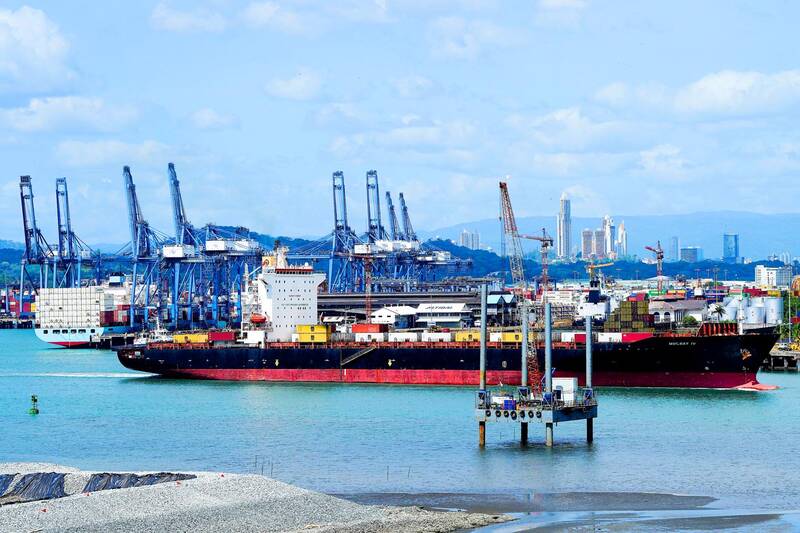Under fierce pressure from US President Donald Trump, Hong Kong firm Hutchison on Tuesday said it had agreed to sell its lucrative Panama Canal ports to a US-led consortium.
CK Hutchison Holdings Ltd (長江和記實業) said it would offload a 90 percent stake in the Panama Ports Co (PPC) and sell a slew of other non-Chinese ports to a group led by giant asset manager BlackRock Inc.
The sellers are to receive US$19 billion in cash, the company said in a statement.

Photo:: Reuters
Hutchison subsidiary PPC has for decades run ports at Balboa and Cristobal on the Pacific and Atlantic ends of the interoceanic waterway.
However, since taking office in January, Trump has complained that China controls the canal — a vital strategic asset that the US once ran.
“To further enhance our national security, my administration will be reclaiming the Panama Canal, and we’ve already started doing it,” he said in a speech to Congress on Tuesday. “We’re taking it back.”
Trump had refused to rule out a military invasion of Panama to regain control, sparking angry protests and a complaint to the UN by the Central American nation.
In a joint press release with the buyers, Hutchison said the deal was motivated by business, not politics.
“I would like to stress that the transaction is purely commercial in nature and wholly unrelated to recent political news reports concerning the Panama Ports,” CK Hutchison comanaging director Frank Sixt said.
“This transaction is the result of a rapid, discrete but competitive process in which numerous bids and expressions of interest were received,” said Sixt, who described the chosen agreement as “clearly in the best interests of shareholders.”
BlackRock CEO Larry Fink said the transaction demonstrated his consortium’s capacity to “deliver differentiated investments for clients.”
“These world-class ports facilitate global growth,” he added.
The Panamanian government, for its part, said the sale was “a global transaction, between private companies, driven by mutual interests.”
It added that an audit launched into the PPC by the Panamanian comptroller’s office that oversees public entities would continue in spite of the sale.
The deal entails 43 ports comprising 199 berths in 23 countries.
CK Hutchison is one of Hong Kong’s largest conglomerates, spanning finance, retail, infrastructure, telecoms and logistics. It is owned by Hong Kong billionaire Li Ka-shing (李嘉誠).
Shares in CK Hutchison yesterday soared 25 percent in Hong Kong after the sale was announced.
Since 1999, the canal has been run by the Panama Canal Authority — an autonomous entity whose board of directors is appointed by Panama’s president and National Assembly. The 80km-long canal handles 5 percent of global maritime trade, and 40 percent of US container traffic.
Beijing has consistently denied interfering in the canal.

NOT JUSTIFIED: The bank’s governor said there would only be a rate cut if inflation falls below 1.5% and economic conditions deteriorate, which have not been detected The central bank yesterday kept its key interest rates unchanged for a fifth consecutive quarter, aligning with market expectations, while slightly lowering its inflation outlook amid signs of cooling price pressures. The move came after the US Federal Reserve held rates steady overnight, despite pressure from US President Donald Trump to cut borrowing costs. Central bank board members unanimously voted to maintain the discount rate at 2 percent, the secured loan rate at 2.375 percent and the overnight lending rate at 4.25 percent. “We consider the policy decision appropriate, although it suggests tightening leaning after factoring in slackening inflation and stable GDP growth,”

DIVIDED VIEWS: Although the Fed agreed on holding rates steady, some officials see no rate cuts for this year, while 10 policymakers foresee two or more cuts There are a lot of unknowns about the outlook for the economy and interest rates, but US Federal Reserve Chair Jerome Powell signaled at least one thing seems certain: Higher prices are coming. Fed policymakers voted unanimously to hold interest rates steady at a range of 4.25 percent to 4.50 percent for a fourth straight meeting on Wednesday, as they await clarity on whether tariffs would leave a one-time or more lasting mark on inflation. Powell said it is still unclear how much of the bill would fall on the shoulders of consumers, but he expects to learn more about tariffs

Greek tourism student Katerina quit within a month of starting work at a five-star hotel in Halkidiki, one of the country’s top destinations, because she said conditions were so dire. Beyond the bad pay, the 22-year-old said that her working and living conditions were “miserable and unacceptable.” Millions holiday in Greece every year, but its vital tourism industry is finding it harder and harder to recruit Greeks to look after them. “I was asked to work in any department of the hotel where there was a need, from service to cleaning,” said Katerina, a tourism and marketing student, who would

i Gasoline and diesel prices at fuel stations are this week to rise NT$0.1 per liter, as tensions in the Middle East pushed crude oil prices higher last week, CPC Corp, Taiwan (台灣中油) and Formosa Petrochemical Corp (台塑石化) said yesterday. International crude oil prices last week rose for the third consecutive week due to an escalating conflict between Israel and Iran, as the market is concerned that the situation in the Middle East might affect crude oil supply, CPC and Formosa said in separate statements. Front-month Brent crude oil futures — the international oil benchmark — rose 3.75 percent to settle at US$77.01